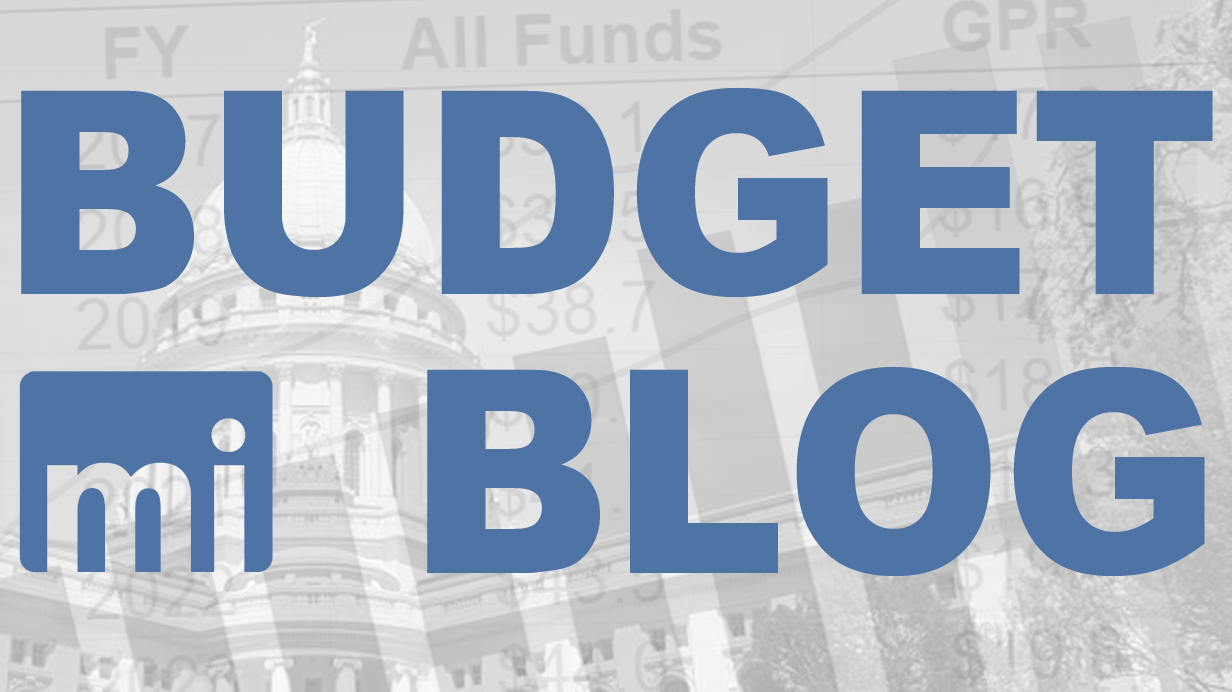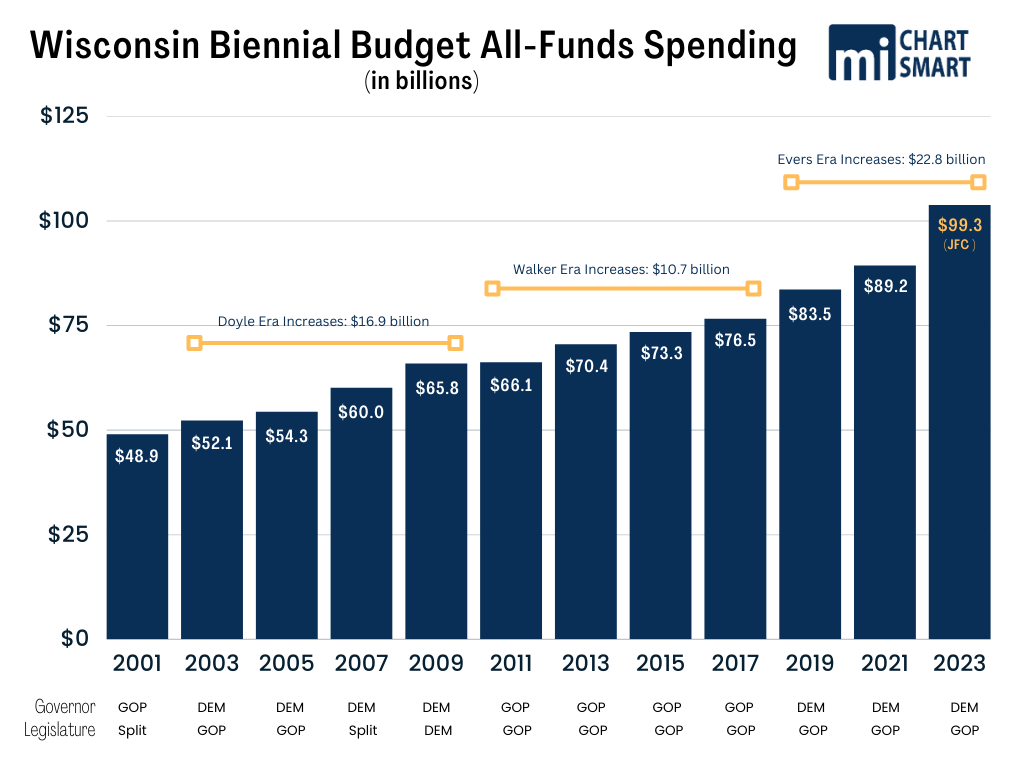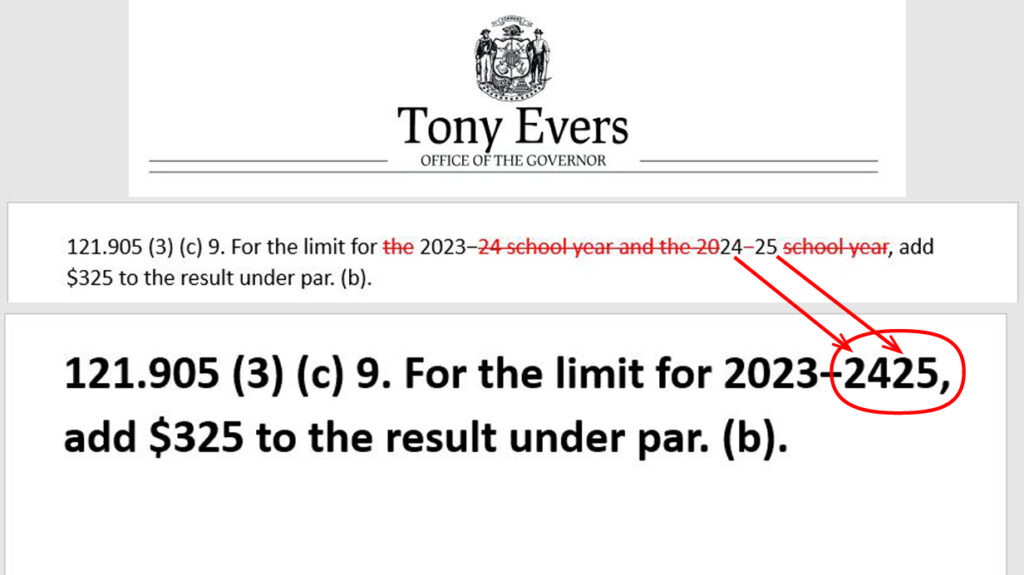
Stick a fork in the 2023-25 budget – it’s done.
Lacking the supermajority required to override a veto, and the extreme unlikelihood of any Democrats suddenly breaking rank to override their governor, Governor Evers’ actions today put the budget into the history books.
In about the only thing about the budget that was not a historic record-breaker, this year’s 51 vetoes are nowhere near the high (457 in 1991), and don’t even set a personal best for Evers, who vetoed 50 items in the 2021-23 budget and 78 in 2019-21.
With 51 partial vetoes, the die is cast on state spending for the next 2 years (except for the parts where the vetoes set spending increases for the next 4 centuries). All that’s left is for taxpayers to pay the historically large bill and do it without tax relief.
More than $3 billion are now at risk of being spent during the remainder of the legislative session, on top of the budget’s already-hefty, historic $10.3 billion spending increase which expands government in one budget nearly as much as the total increase over all 4 of Governor Walker’s budgets combined.
Today’s vetoes fall into a few categories: should have been expected, expected, and it-was-on-a-billboard-expected.
Tax Relief
Income Tax Cut Up In Smoke
The main casualty of the veto pen was the $3.5 billion income tax cut, hurriedly put together with no input from the governor in an effort to wrap up the budget before end of the fiscal year, and perhaps more importantly, the long holiday weekend.
Evers, who repeats the phrase ‘middle-class tax cut’ like Biden repeats made up stories about his relatives, was sure to veto the across-the-board cut which made substantial progress in reducing Wisconsin’s high rates in our upper brackets, paving the way for a flatter, fairer, more competitive flat tax.
Evers vetoed the cuts to the two upper brackets and left the cuts to the two lower brackets, shrinking the historic $3.5 billion in proposed income tax cuts to under $200 million.
Net Veto Effect: 95% of the proposed income tax cut went up in smoke faster than Hunter Biden’s crack.
For context, the upper two brackets start with income earners making over $25,520 (about $12.50 per hour full-time) – a level most would call the working poor, not the middle class. Evers’ vetoes mean that income over $25,000 per year will be subject to higher rates of income taxation than millionaires – even billionaires, trillionaires, and gazillionaires – pay in Illinois and Michigan.
So much for middle class tax cuts.
From MacIver’s analysis last week:
The most serious problem with this much-needed and historic income tax cut is that it is unlikely to become law. According to Legislative Republicans, the income tax cut was NOT part of the budget negotiations they held with Governor Evers. Republicans and Evers did reach agreements on K12 funding, School Choice, the Milwaukee pension bailout, Shared Revenue, and literacy improvement, but not the tax cut.
Without a budget agreement where Republicans give Governor Evers one of his top budget priorities – say a $1 billion dollar increase in spendable K12 school aid – in exchange for his approval (his assurance not to veto) of this tax cut, there is no certainty that the tax cut will survive.
Maybe we are wrong. Maybe the Republicans are correct. We hope we are wrong.
But if Governor Evers vetoes the entire tax cut or even if he vetoes out the parts of the tax cut that help small businesses and successful individuals, this historic tax cut becomes a historic missed opportunity and a failure to negotiate for what our state needs most – transformative and long-lasting tax reform. Remember, this budget process started with a $7 billion surplus and here now at the end of the process we are not sure if some of that surplus is going to make it back to where it all should go – you, the taxpayer.
If Evers were to veto the tax cut and some of these other victories we discuss later in this piece are overturned, that would guarantee this as the biggest Democrat budget victory in decades – record-high spending at the state and local level, little to no tax relief, a billion+ in additional K12 funding with no reforms, and an ever-growing source of tax revenue for the liberal Democrats in Milwaukee.
Other Tax Relief
The personal property tax shift and the property tax relief were left intact. That means that all told, the $4.4 billion tax relief dwindled to a mere $1.1 billion, the vast majority of which simply shifts tax dollars from the general fund to local governments.
Education
Perpetuity-Pupil Increases
The other veto that’s capturing a chunk of attention is the 402-year per-pupil increase of $325 a year for schools.
The education “deal” was portrayed as an agreement on a $325 per-pupil increase for this biennium. The allowed per pupil increase is set budget to budget and since Governor Walker’s first budget has varied from $0 to $529. By vetoing some numerals and punctuation, the governor set $325 as the annual allowable increase through the year 2425.
If the number holds for the next 400 years (i.e. it isn’t changed in subsequent budget action) it would mean property tax increases for homeowners. In the past, the Legislature has offset this property tax increase with levy credits and other property tax relief measures. Such property tax relief increases were in this budget.
Other K12 Education Vetoes
The perennial GOP grant to the Lakeland STAR Academy was vetoed as usual.
The high poverty appropriation to school districts, eliminated in the legislature’s budget, was retained through Evers veto. No funding is provided, but the appropriation is retained in statute.
DEI/Gender
Evers restored the 188 Diversity, Equity and Inclusion (DEI) positions eliminated by the legislature from the University of Wisconsin System. Gov. Evers left the $32 million in the JFC account for the UW to access under terms of the legislature’s budget.
Also struck from the bill: the legislature’s provision prohibiting (to the extent allowed by federal law) the expenditure of Medicaid funds for puberty blockers and gender transition surgery. Evers said the legislature’s provision was hateful, discriminatory, anti-LGBTQ.
Shared Revenue Deal Vetoes
The historic deal that increased local government spending at record levels was funded by the creation of a new local government fund in the budget. Evers made tweaks to the legislature’s language, eliminating the requirement that money left in the fund would revert to the general fund. He also vetoed the requirement that the administrative skim of the new Milwaukee sales taxes taken by DOR to be lapsed to the general fund. Instead, DOR will keep the administrative skim.
Milwaukee Deals Veto
The legislature earmarked $10 million in 2023-24 for Visit Milwaukee through the state Department of Tourism – funds Milwaukee leaders said were needed for the city to cope with the magnitude of hosting the historic 2024 Republican National Convention. Evers slashed the earmark by 90%, limiting it to just $1 million, and eliminated the requirement that it be provided this year. The additional $9 million will stay with the state Tourism department. This placed the amount and the timing of the award to the city completely in the control of the Evers Administration.
It’s a fair bet that the governor won’t deny his Milwaukee pals, but in the meantime he plans to enjoy making the RNC dance to his tune in order to get it.
Justice
Vetoes eliminated a few notable items in justice-related areas:
Legislative Republicans provided a nearly 18% increase for CCAP – the online court case database – but did not specify what the additional funds were to be used for. It appears that without an explanation of what the expansion of the utility of the database was for – so that it’s easier for the public to track Scold and Release DAs and judges responsible excessive plea bargains, low bail and light sentences is long overdue, but continually opposed by those same groups – Evers vetoed the increase.
Also eliminated was the square footage specification for the new Juvenile Corrections Facility. The governor claimed this level of detail is not generally included in the budget; however this could telegraph that, like Dane County is doing with their jail, the administration intends to undersize the facility in an attempt to keep incarceration levels artificially low.
The Dignitary Protection Unit coverage for members of the Supreme Court added by Republicans was pulled by Evers who said protection may already be provided under current law.
Another veto allowed funds the legislature allocated to the original Opening Avenues for Reentry Success (OARS) program to be available to the OARS pilot as well.
Stewardship
Evers vetoed out two earmarked projects under the Stewardship program, leaving the $2.5 million bonding authority that can be used by the DNR as they see fit.
Repayment is so Yesterday, Boomers
Vetoes transformed the legislature’s $15 million childcare loan program into a grant program, and similarly, a low-income homeowner home renovation loan program became a grant program as well.
Similarly, Evers vetoed the repayment of $25 million provided to the state’s ‘fund of funds’ (venture capital) program – and the payment of 90% of investment returns – to the general fund.
Miscellaneous
Like Walker, Evers rejected a number of legislative-mandated reports with his veto.
Evers also lined out several individual pork projects, though he kept the majority.
Evers vetoed the $1 sticker for electric vehicles meant to help inform emergency workers of the unique dangers related to these vehicles, saying the existing registration fee for EVs is more than sufficient to cover the cost of such stickers.
It Wasn’t All Bad
The legislature handed WisconsinEye – the supposed-to-be-privately-funded, public affairs broadcaster covering legislative action, committee hearings and increasingly, interviews/sales pitches from public officials – a $10 million endowment on the condition that they stop charging subscriptions to see the legislature in session. Evers’ veto prevents WisconsinEye from charging subscriptions for any of their now-taxpayer-funded programming.
The legislature’s budget contained a requirement that the Department of Veterans Affairs (DVA) contract for a master plan on the future of the King Veterans Home. Given the systemic problems at DVA, particularly acute at Union Grove, it’s unclear why the legislature limited the plan to King since JFC no longer wants to spend time, or risk scrutiny, making the case for any of their actions. The governor vetoed reference to King and says they will undertake a “more thorough” review of the homes including but not limited to King.
We’ll keep digging into the vetoes – and what this means to the bottom line.

